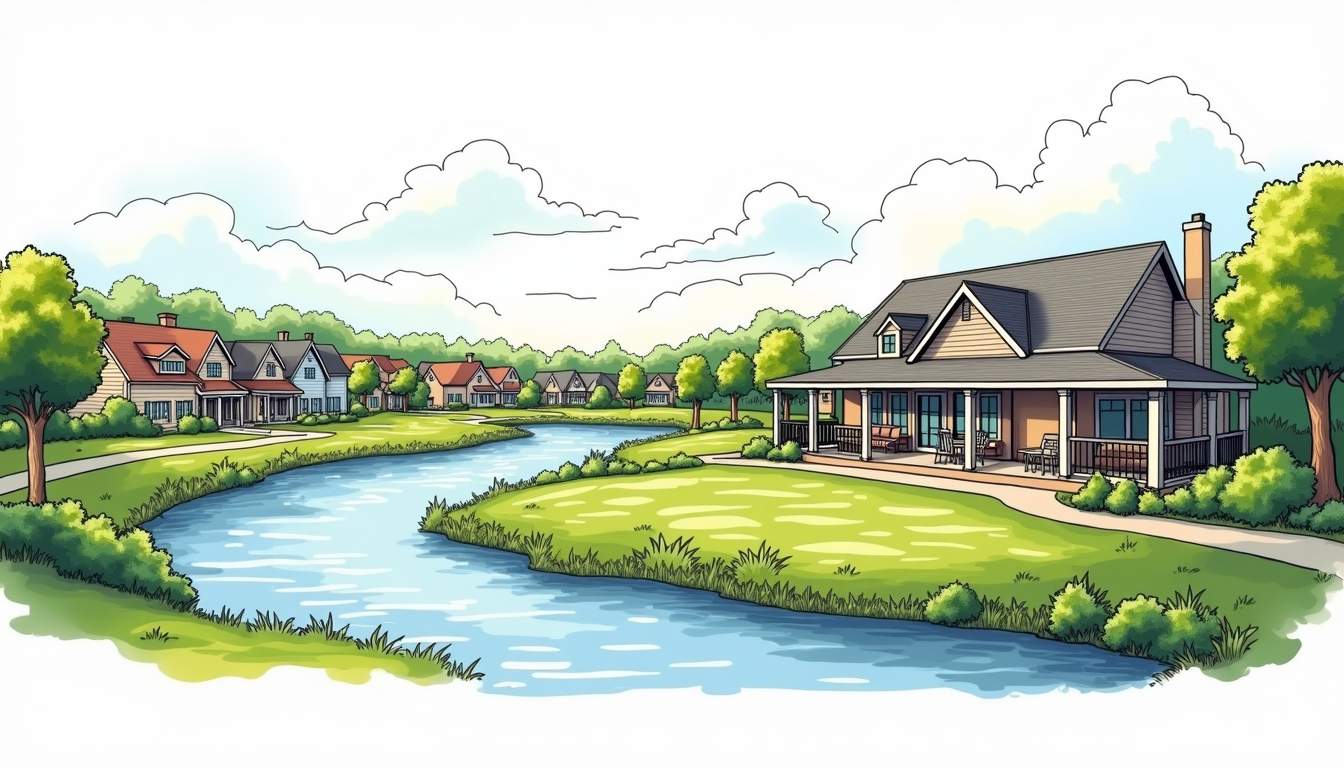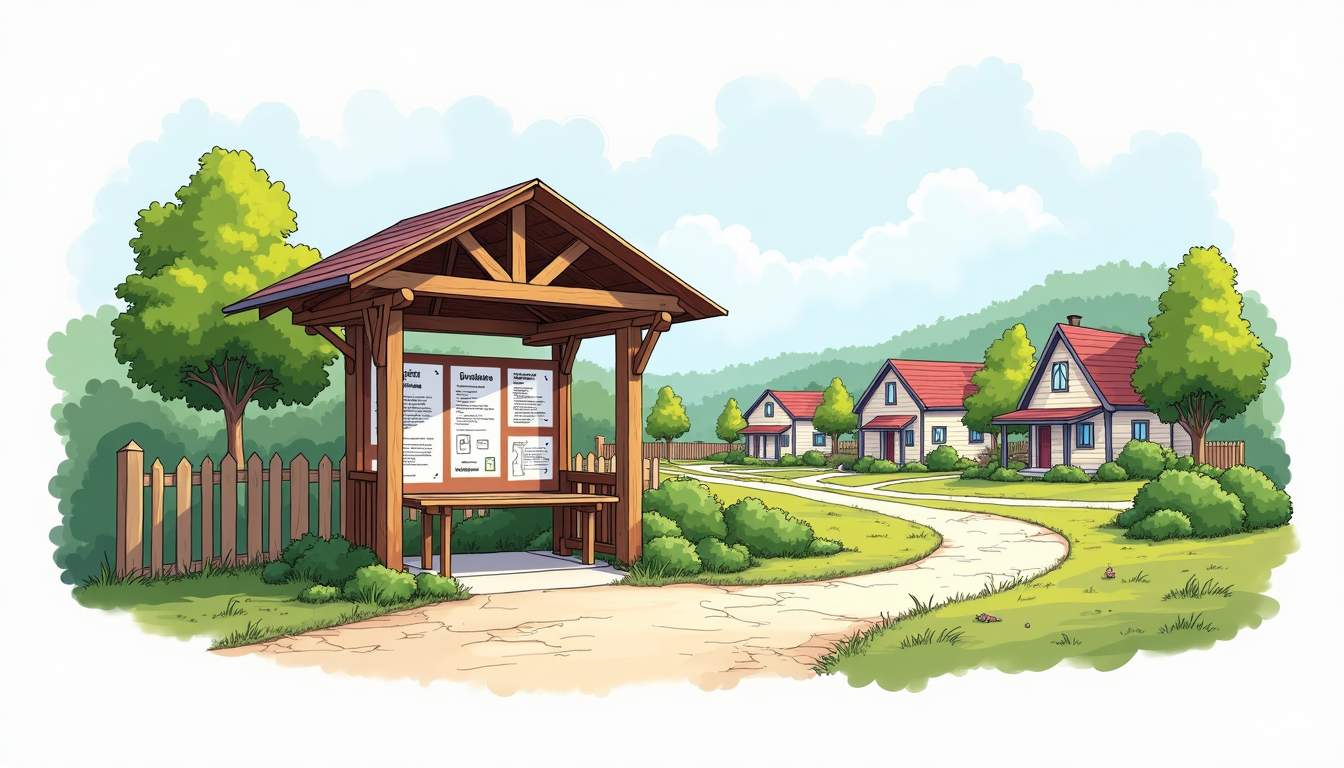
Homes by Water Trails and Clubhouse blends waterfront living, wooded trails, and community amenities in a neighborhood designed for active, family, and nature-minded residents. This guide covers everything from home styles and trail access to clubhouse features, nearby services, and tips for prospective buyers and visitors.
Homes by Water Trails and Clubhouse is laid out to make the most of natural water features and walking paths, with residences sited to maximize views and green space. Streets curve gently around ponds and mature trees, creating a calm, low-traffic environment that encourages outdoor activity and neighborly interaction.

The community was developed with a focus on balancing private living spaces and shared amenities. A central clubhouse anchors social life while miles of trails provide quiet escape for walkers, runners, and cyclists. Landscaping standards and an active homeowners association help maintain property values and a consistent aesthetic without feeling overly restrictive.
Housing options range from single-family homes to paired villas and a limited selection of townhomes. Architectural styles favor craftsman and contemporary vernacular, with elements such as wide porches, gabled roofs, and natural stone or brick accents. Home sizes typically span from comfortable two-bedroom cottages to expansive five-bedroom family homes.
Many homes include design features that take advantage of the local setting: large windows for water views, elevated decks for breezy evenings, and finished walk-out basements. Garages tend to be attached and integrated, and driveways are often set back to preserve the visual continuity of front lawns and sidewalks.
Recent construction or renovated properties often include energy-efficient appliances, upgraded HVAC systems, and double- or triple-pane windows. Solar panels are becoming more common as residents seek to reduce utility bills and environmental impact. Smart-home integrations, such as programmable thermostats and security systems, also appear in newer listings.
Lot sizes vary but many homes sit on modestly sized parcels that prioritize proximity to trails and community spaces over expansive private acreage. Landscaping emphasizes native plants, water-wise techniques, and mulched beds—choices that fit the neighborhood’s semi-rural feel while minimizing maintenance.
A well-connected trail system is the heart of Homes by Water Trails and Clubhouse. Paved paths link the clubhouse to neighborhood loops and extend to scenic boardwalks over ponds. Dirt and gravel trails weave through wooded areas for a closer-to-nature experience, providing excellent routes for walking, jogging, and mountain biking.
Interpretive signage and occasional bench stops invite residents to linger and enjoy wildlife. The trails are designed to serve a wide range of fitness levels: gentle flat stretches near the ponds are ideal for strollers and older walkers, while rolling, shaded segments offer more challenge for runners and cyclists.
The neighborhood’s ponds and small lakes allow for non-motorized water activities. Kayak and canoe launches are positioned for easy access, and quiet coves provide sheltered spots for fishing. Catch-and-release practices are common, and local regulations outline seasons and permitted bait to protect fish populations.
Playgrounds are distributed within easy walking distance for families with children, often located near picnic shelters and open lawns suitable for sports. A fenced off-leash dog area accommodates pet owners who want a secure place for dogs to run, socialize, and burn energy away from the formal trail network.
The clubhouse serves as a social hub, offering spaces for events, fitness, and relaxation. Interiors frequently include a multipurpose room for classes and private gatherings, a well-equipped fitness center, and a lounge area with views onto landscaped grounds. Community calendars routinely feature wellness classes, holiday parties, and homeowners association meetings.

Outdoor features around the clubhouse often include a swimming pool, lap lanes for exercise, and sun decks with seating. Barbecue stations and covered picnic areas support casual get-togethers, while a small sports court or bocce area provides friendly competition options within the neighborhood footprint.
Residents can reserve the clubhouse for private events, subject to the HOA’s booking rules and fees. Small weddings, birthday parties, and neighborhood meetings are common bookings, and management typically enforces capacity limits and cleanup policies to keep the space usable for everyone.
Many clubhouses offer scheduled classes such as yoga, pilates, and aquatic fitness. Instructors may be community-employed or contracted from local studios, and occasional wellness workshops cover topics like nutrition, home safety, and seasonal preparedness. These programs are popular ways to meet neighbors and stay active without leaving the neighborhood.
School options include public schools within the local district and several private or charter schools a short drive away. Elementary schools are typically within walking or biking distance for children who live in the neighborhood, and school bus routes often pick up and drop off at central points for older students.
Public transit access depends on the region’s infrastructure, but many residents rely on personal vehicles for commuting. Carpool groups and neighborhood ride-share arrangements reduce solo driving for work commutes. Nearby highways connect residents to employment centers, shopping districts, and recreational attractions.
Daily conveniences are within a short drive: grocery stores, pharmacies, and a mix of dining options from casual cafes to family-style restaurants. Medical services, including urgent care and dental clinics, are commonly available in adjacent commercial corridors, while hospitals and specialists are accessible in nearby urban centers.
Residents appreciate proximity to regional parks, historic districts, and cultural venues. Weekend outings might include farmer’s markets, outdoor concerts, and boating or hiking in nearby natural preserves. Seasonal events—holiday light displays, summer festivals, and fall fairs—help foster a strong sense of local identity.
The market in Homes by Water Trails and Clubhouse tends to reflect demand for amenity-rich, nature-adjacent neighborhoods. Turnover rates are moderate, with homes that have water or trail frontage often commanding a premium. Pricing varies with size, upgrades, and lot orientation, so buyers should prioritize which features matter most.
Preapproval for a mortgage strengthens an offer, and working with a local agent who understands HOA rules and specialty aspects of water-adjacent properties can make negotiations smoother. For resale value, features like energy upgrades, finished basements, and professionally maintained landscaping are attractive to future buyers.
Water-adjacent properties require careful inspection for drainage, erosion, and potential flood risks. Septic systems or shorelines, if present, should be evaluated by specialists. Roofs and siding deserve attention in areas with heavy tree cover, and routine checks for mold or moisture issues help prevent long-term damage.
The HOA typically manages common areas, trails, and the clubhouse, and dues cover maintenance, insurance for shared spaces, and reserve funds. Architectural review processes ensure aesthetic cohesion; prospective buyers should review covenants, conditions, and restrictions (CC&Rs) and understand any limitations on rentals, exterior modifications, and landscaping choices.
The culture in Homes by Water Trails and Clubhouse tends to be active and community-oriented. Regular social events, volunteer committees, and fitness groups create opportunities for neighbors to connect. Families appreciate the safe, walkable streets and frequent kid-friendly programming while retirees and remote workers value the quiet and scenic views.
Volunteerism is prominent; residents often step into roles on landscape committees, safety patrols, and events planning. That civic engagement contributes to low vandalism and a strong sense of stewardship for shared spaces and wildlife habitats.
Neighborhood safety is supported by low-speed limits, well-lit streets, and community watch groups. Emergency response times are generally favorable due to nearby municipal services, and the HOA typically publishes safety tips and emergency plans during severe weather seasons.
Living near water and wooded areas requires seasonal awareness. Flood watches, ice management on ponds, and storm prep for heavy winds are part of homeownership in the area. The community often coordinates debris removal, tree-trimming schedules, and winter snow-clearing routes to reduce individual burden.
Visitors are welcome on trails and at most outdoor amenities, though clubhouse access usually requires a resident host or rental. Day-use parking is available at trailheads and a visitor lot near the clubhouse, but peak times—weekend mornings and summer afternoons—can be busy. Respect posted rules about litter, leash laws, and permitted activities.

Photography and birdwatching are popular, and interpretive signage helps visitors identify native plants and animals. Drone use, commercial photography, and special events often require prior permission from the HOA to avoid disruptions and protect privacy.
Homes by Water Trails and Clubhouse offers a lifestyle that blends outdoor recreation with suburban convenience. The neighborhood suits a wide range of residents—from growing families to empty nesters—because it combines safe, walkable streets with social infrastructure like the clubhouse and organized community events.
Before committing to a purchase, it is wise to take multiple visits at different times of day, review HOA documents closely, and assess long-term maintenance needs related to water proximity. Doing so helps ensure the neighborhood aligns with lifestyle preferences and investment expectations.
Is the neighborhood pet-friendly? Yes. Leashed pets are welcome on most trails, and a fenced dog park provides a secure off-leash option for active dogs.
Are short-term rentals allowed? Policies vary. Some HOAs restrict short-term rentals or require registration and specific insurance—confirm with the HOA prior to listing a property as a vacation rental.
What are the parking and visitor policies? Street parking is available in most areas, but guests are encouraged to use designated visitor lots near the clubhouse to minimize congestion. Large events may require temporary parking plans coordinated by the HOA.
Homes by Water Trails and Clubhouse presents an appealing mix of natural beauty and practical amenities. Whether seeking daily outdoor recreation, a tight-knit neighborhood, or a family-oriented environment with modern conveniences, the community offers a well-rounded option for those who value water, trails, and clubhouse living.
If you appreciate the blend of natural beauty, active lifestyles, and community amenities found in Homes by Water Trails and Clubhouse, Tennessee National offers an elevated experience just for you. Nestled in Tennessee’s stunning landscape, our gated community features a Greg Norman Signature Golf Course, private marina, waterfront dining, and over 20 member amenities. Whether you seek a move-in ready home or a custom build, find your perfect fit among our diverse living options. Experience resort-style living with scenic trails, vibrant social clubs, and exclusive events designed to enrich your everyday life. Schedule a private tour today and start making memories in a community crafted for you.